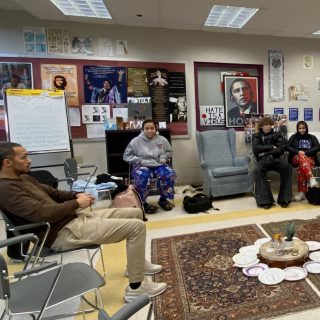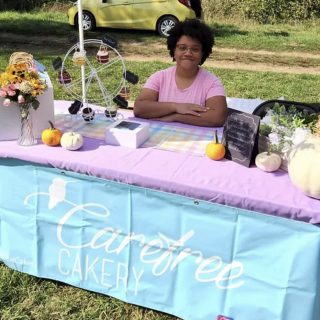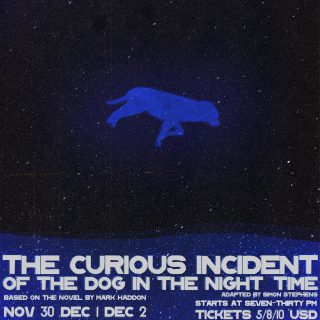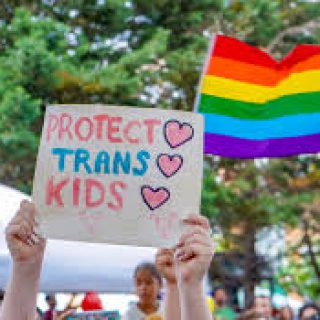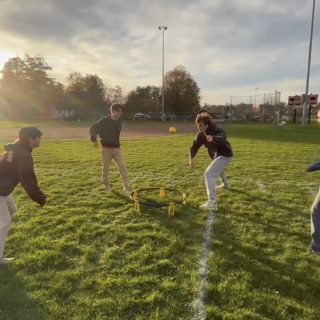‘If we are going to move towards peace, we have to practice containing multitudes’: an interview with Jena Schwartz
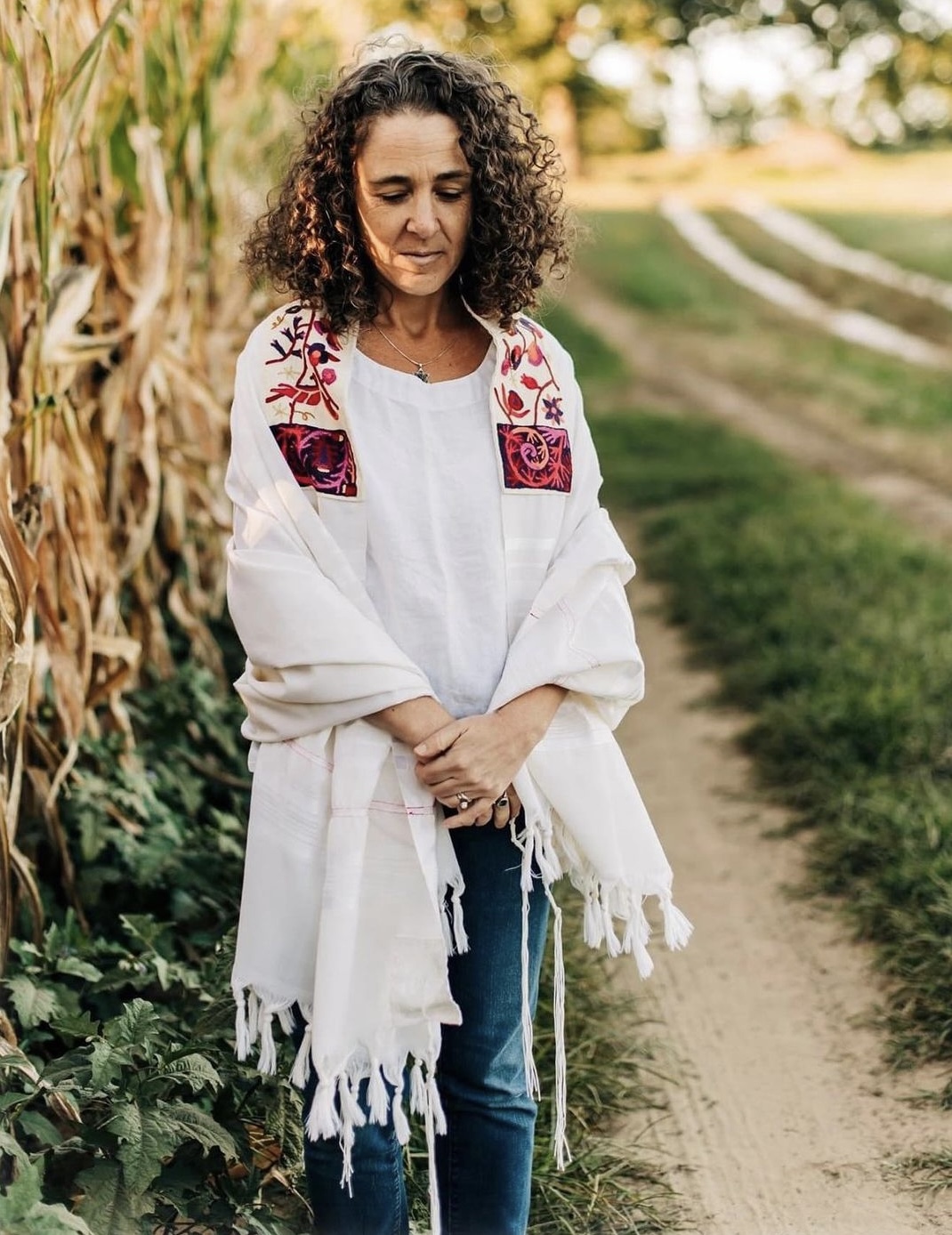
After reading about the Israel-Hamas war in Journalistic Writing class and watching reactions unfold on the ground and on social media all over the world, I set out to talk, and more importantly listen to, members of our community who have a deep connection to what is happening in Gaza and Israel. I spoke with two Amherst residents, one Palestinian American and one Jewish, both of whom are writers by trade. Both are invested in anti-oppression work. Their interviews are printed separately and their views are their own and by no means represent an entire group. My hope was simply to move beyond scrolling on Instagram or TikTok and to speak at length with people who are reeling from what is happening in this part of the world, people who hold a lot of knowledge and care deeply.
Jena Schwartz is a queer Jewish resident of Amherst and a mom of a current ARHS senior. She is a poet, essayist, and writing coach and the Poet Laureate at the Jewish Community of Amherst. Her website is called “Fierce Encouragement for Writing and Life.” On that site, her bio reads, “I’m an extroverted introvert, a lover of trees and seasons, Jewish wisdom, freshwater swimming, etymological rabbit holes, babies, and bulldogs. All of my work, from writing prompts to online groups, from individual coaching to editing for emerging and experienced writers alike, is devoted to creating safe and brave spaces where we get to write, share, and connect.” Schwartz has been writing almost daily about the events in Israel and Gaza on Facebook, Instagram, and Substack, and spending time in community with others, trying to make sense of what is happening in the world.
Ayo: What is your connection to Israel?
Jena: I’m a Jewish American. To me, Israel is both a country and also (in Jewish tradition) it’s a people–The People of Israel. For so many American Jews, it’s a complex thing. In a more concrete sense, I have been to Israel one time in 2019, with my parents and my daughter. I had always felt a longing to visit Israel, I also felt some trepidation because I didn’t know how I would feel there. Being there was very life-changing for me. It felt like what I expected, like I was home. In my bones and in a cellular way. I was aware of the complexity of the region, of the fact that I was seeing Israel through a very particular lens. We had an Israeli guide. It was amazing. I was aware the whole trip that it wasn’t the whole story. My relationship with Israel has many layers.
Ayo: Just to touch on that, as a non-Jew, from my understanding, coming to Israel as a Jewish person, it can be a spiritual type of thing, a coming home.
Jena: The country itself is very secular. The vast majority of Israeli Jews are secular Jews. But you go there, there’s an experience of being somewhere where it’s like ‘Oh! Wow, almost everyone is Jewish.’ Of course, there are many ethnicities and religions but it’s a majority Jewish country. And you feel that, as a Jew, when you’re there. So for me, that was profound.
Ayo: Do you have family or friends there?
Jena: I do not have close friends, but family friends. I know people there. People I’ve worked with. The thing is, the Jewish world is so small. We’re such a small people that it’s like two degrees of separation. When people ask American Jews, ‘Do you have family in Israel?’ [They almost always have a connection]. On Monday, two days after October 7, our synagogue held a vigil. Our rabbi gave some remarks inviting anyone who wanted to come to the microphone. We’ve had other times for people to share how they were feeling about things, but this was just a chance for people to speak about anyone that people had in Israel, anyone there people were holding in their hearts, praying for. And just person after person after person got up to say prayers for people: “My first cousin,” “My sister’s whole family,” etc. It’s so intimate, the connections to other Jews, to Israel.
Ayo: How are you feeling about what is happening right now?
Jena: Many things at once. I told my daughter who is 21 how I’ve never experienced anything like this. I’ve had a lot of feelings about things in the past that felt multi-faceted and hard to sort out. So I guess I can just share some of them.
I’m feeling a kind of grief that has been just crushing at times, a tremendous grief. I’m angry, bewildered, confused, and isolated. There are a lot of pieces to that. The actual massacre that occurred [on October 7] is something that a lot of people aren’t talking about, spending time taking in those stories.
The people who were murdered, brutally, cruelly, tortured, raped, beheaded, burned alive. I have felt much of the world hasn’t registered or chosen to address that. So that’s just been such a combination of grief and shock. It’s a thing I don’t have a word for. Experiences that Israelis are living, in the wake of that.
And I hear your question about the broader region and I also am devastated by the human cost of what is happening in Gaza and the conditions there. I feel that this is where some of the anger, confusion, and grief come together. It’s all just a big mashup of emotion.
I don’t want to get into a blame game because I don’t think that’s productive, but I do not believe Hamas is invested in the safety or well-being of the people in Gaza. And that for me is such a heartbreak.
Ayo: Did it almost feel like an exclusively Jewish feeling to sit down and grieve those losses?
Jena: I wouldn’t say it’s exclusively Jewish because I’ve heard from non-Jewish friends who have reached out to express their hurt, so no, I don’t want to say that no one else cares. However, I do struggle to fathom as a human being the ability to justify what happened. I cannot fathom how you can respond to those attacks with anything but just utter repulsion. Period. Set aside political beliefs, opinions about Israel as a country, or Israeli oppression and Palestinian liberation. I think all of those are hugely important.
I want Palestinians to be free and have self-determination. I completely want that.
I’ve never seen there be such a horrific act of violence [such as the October 7] and the immediate response that followed was, ‘Well, they kind of deserved it,’ or ‘it was inevitable; they had it coming.’ So, that for me is really gutting. And not just as a Jew, but also as a person. Not that I can separate my identities, but it’s a human response. The fact of not being able to at least pause and acknowledge. The hostages in Gaza represent over 30 countries. That’s a lot of countries.
Ayo: Are you saying when someone looks at that and says ‘You kind of deserved that,’ would you say this is a type of subconscious antisemitism that the world holds?
Jena: Hamas’s goal is to eradicate the Jews from the world, and this is how they will do it. You are the first non-Jewish person I’ve heard who has addressed the antisemitism that is kind of implicit here. And I absolutely think it’s there, whether it’s conscious or not. And I’d like to think for many people it’s not. I think as a Jew it’s impossible not to feel that, hear that, and also see echoes of it throughout history that somehow it’s okay [to harm Jews].
Ayo: What are your thoughts on a two-state solution and how?
Jena: A lot of people are very hesitant to say anything about this because of not being an expert, or the complexity of the situation, but a two-state solution to me if it were possible to achieve, sounds great. In theory, I think that would be wonderful. There have been instances where that looked possible that got derailed by people who don’t want to see that happen, including Jews. Take for example Yitzhak Rabin’s assassination in 1995. And that’s the kind of government that Israel has right now.
Ayo: How it would look for two states to exist equally? How would it look for Palestine to be free?
Jena: That is the question. What does it look like for Palestine to be free? That’s the question. Does that mean Israel no longer exists? This is certainly what Hamas wants. I mean [for them] a free Palestine means no Israel. There is a big question in my mind, where are the Jews supposed to go? Honestly, to answer the question, I don’t know that I have the imagination. I’d like to think, yes, what does it look like for Palestinians to create their own government and live in this place that is sacred to both people?
Ayo: What are your tboughts about Israel’s military response to Hamas’s attack?
Jena: I am really sorting that out for myself right now to be honest. I want the hostages to be released and for Israel to get rid of Netanyahu and for Gaza and Israel to somehow become free of Hamas.
I think that Hamas is using people in Gaza as collateral, and it’s obviously a devastating humanitarian and political crisis that cannot be easily simplified.
I’ll be honest, I also feel like there is no other country in the world that would be told they didn’t have the right to defend themselves if terrorists attacked. But with Netanyahu at the helm, it’s very scary because he’s [essentially] doing what the U.S. did after 9/11. We saw how that went, and I don’t want that.
I reached out to my rabbi to ask if I could talk with him next week. I need guidance [navigating] all this. I’m listening to a lot of different voices in both the Jewish world and outside. I’m reading a lot, and I’m really feeling just completely torn up about it.
When I see children suffering or dying anywhere my heart breaks. There are babies being held hostage. And the death toll in Gaza… there are no adequate words. The Israeli government must be stopped in terms of being hellbent on destroying Gaza. Israelis must also be safe. Hamas must be stopped in terms of being hellbent on destroying Israel. Palestinians must also be safe – and free. So how do these things get achieved? I wish I had an answer, but the truth is I lack the certainties and moral/political purity that so many people are putting forth right now.
Ayo: As a Jewish person, what are your thoughts on the political fusion of the state of Israel and the Jewish people and thus blaming Israel’s wrongs on all of the Jewish people?
Jena: Over the years I’ve been critical of Israel the government, I’ve expressed my opinions about being angry with the Israeli government as a Jew. So I don’t feel like, ‘Oh, I’m Jewish; so I agree with the state of Israel and everything that Israel does as a nation. But I feel like the reality, regardless of the theory of it, is that any distinction between anti-Zionism and antisemitism has totally collapsed. That’s probably the truest thing I can tell you.
It’s an empirical thing. If you look at the rise of antisemitic instances in the US, across college campuses, in other countries, synagogues, dorms, and in the streets. The sentiment is against Israel. But if that were solely true, if [hateful people] were just opposing Israel as a government, why would they be attacking Jewish people?
So I don’t think there’s really any difference right now. And I think it’s alarming to me that more people aren’t actually seeing that and really getting the implication of it, for all of us, not just for Jews.
People are forming opinions based on their first gut reaction, rather than taking the time to listen, to learn, to think critically to develop an understanding the best they can.
JENA SCHWARTZ
Ayo: What would you say about people who have limited knowledge of the situation and form opinions and express them on it? How does that impact the conflict?
Jena: I have seen that and I think it’s a reflection of how we have come to relate to world events, news cycles, tragedies, and experiences of mass violence that have unfortunately become totally common. And social media is at the heart of all of that.
Something happens and for some time, whether it’s 2-3 days or 2-3 weeks, that’s the thing that everyone is sharing. So you go on Instagram or wherever, it quickly takes on a life of its own. I think it’s incredibly dangerous for Jews, for Palestinians, it’s dangerous in general. It’s adding fuel to the fire. People are forming opinions based on their first gut reaction, rather than taking the time to listen, to learn, to think critically to develop an understanding the best they can.
It doesn’t mean you can’t or shouldn’t have an authentic immediate response to something as a human, but I don’t get the feeling that’s it for a lot of people,
Ayo: Theoretically, what do you think the entities in power can do right now moving forward?
Jena: Good question. I’m really thinking about it. I want to consider that, what is something that could happen right now? In a perfect world, Israel would call a ceasefire, the hostages would be released, and the world leaders would be united not only for one people or the other but to say, ‘We need to work this out’ and come to the table with the intention of finding a peaceful solution to something that has been impossible to solve so far. Do I think that’s going to happen? No, I don’t think that’s realistic. But would I want to see that? Yes.
Ayo: Can you describe anything else that feels complicated about how Israel or Jews are framed in this dialogue about power and oppression?
Jena: It’s complicated. The founding of Israel was on the heels of the Holocaust, where 6 million Jews were murdered. The U.S. didn’t want the Jews. Other countries didn’t want the Jews. The history of the Jews is commonly that no one wants the Jews so, where are we supposed to go? But, I also don’t want my freedom to be bound up with someone else’s oppression, because that’s not freedom. I am committed to anti-oppression work and I have been for my whole life so none of this is simple.
I think that that is part of the anguish that I live with. Israel is an incredibly diverse place, Jews from Arab nations, all through the Middle East were expelled from their countries because they didn’t want them.
The idea of imposing a Western framework onto this region [the Levant] doesn’t actually work. There’s a comparison that is being drawn between Zionism and American colonialism that is inaccurate; Jews are indigenous to Israel, with millennias-long history in the region.
Ayo: Would you say that there is an Israel without oppression? At where we are now, do you think it’s possible?
Jena: I sure hope so. Our rabbi said at the vigil, ‘We have to hope for hope.’ I’ve been really carrying that. Carrying hope is hard work but it’s also really important. I recently published a piece in the Jewish Journal called “I Don’t Want to Win.” For me, writing is how I sit with and sift through things that feel contradictory, intractable, and excruciating. Ultimately, it’s one of my deepest forms of prayer. If we are going to move towards peace, we have to practice containing multitudes.

